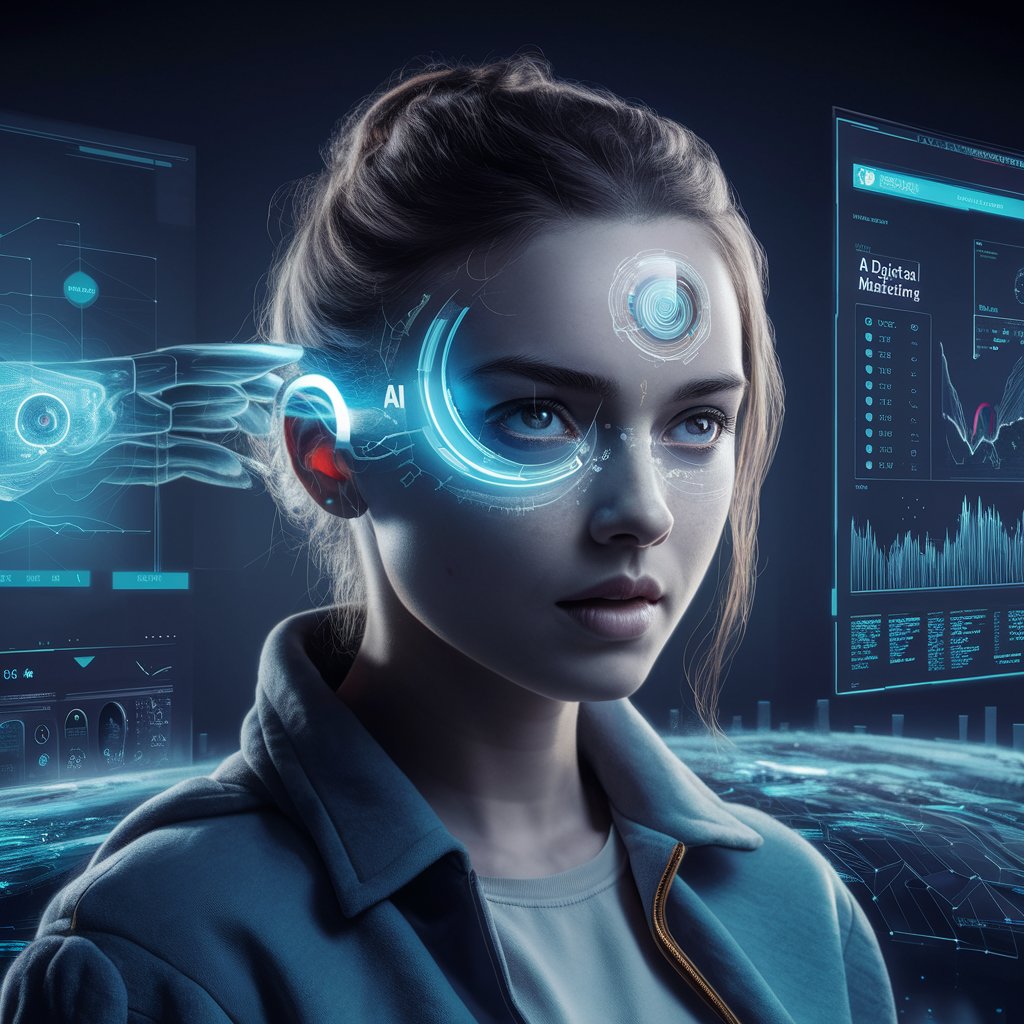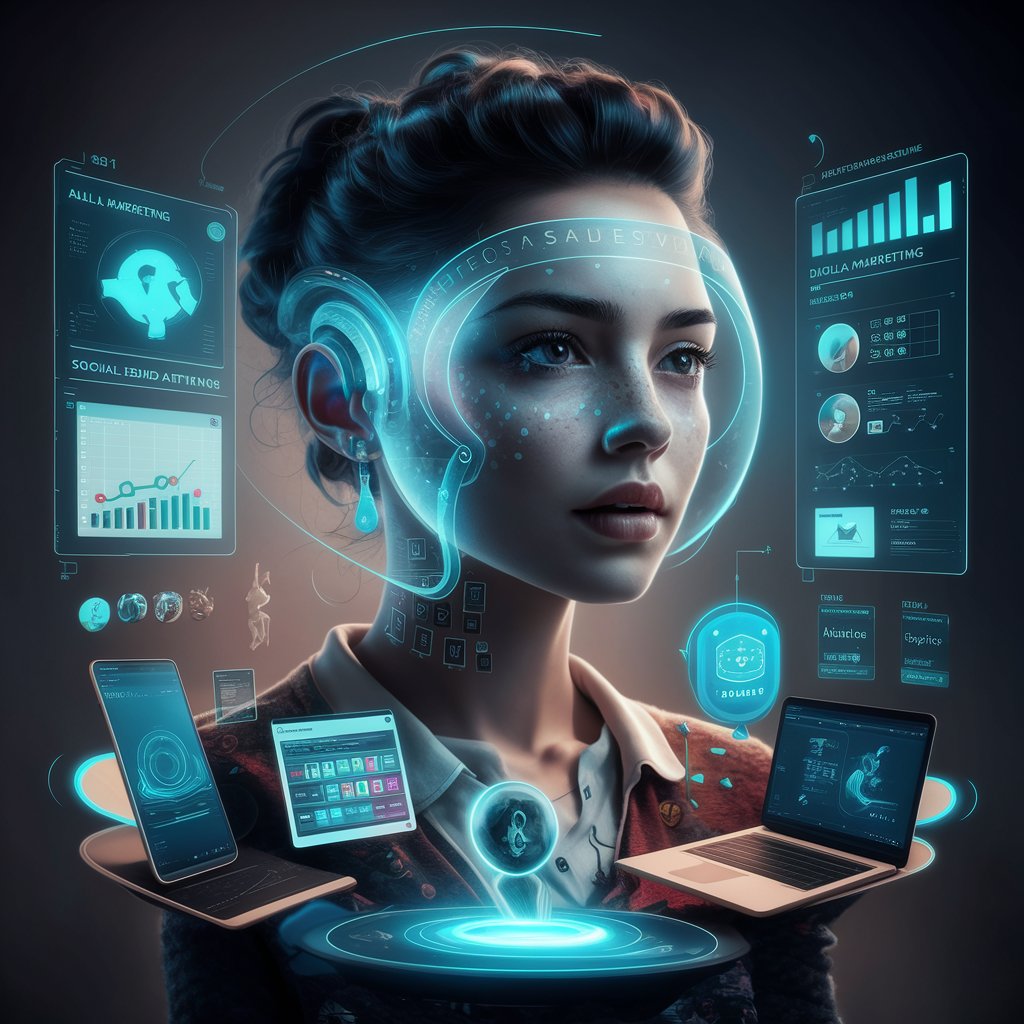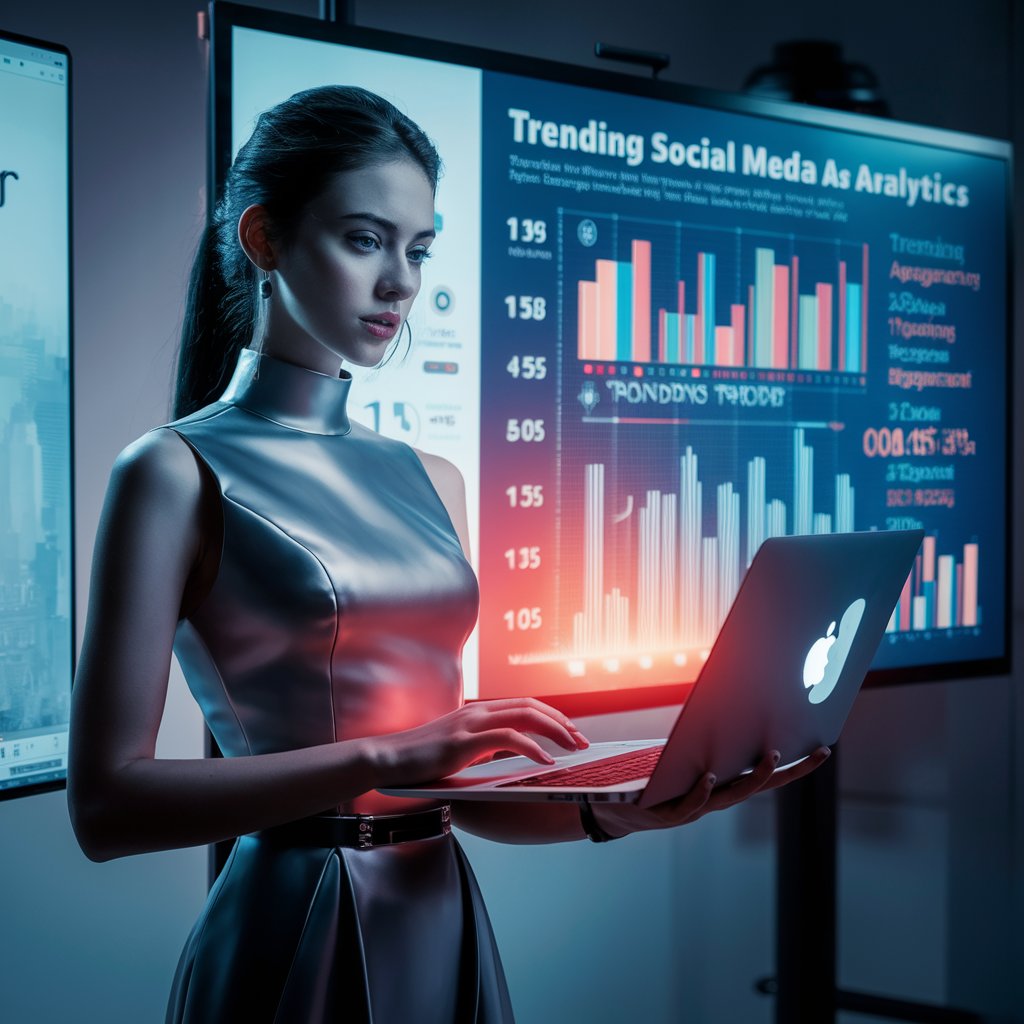Introduction
Artificial Intelligence (AI) has revolutionized the digital marketing landscape, transforming how businesses engage with customers and optimize their marketing strategies. In today’s fast-paced digital world, AI’s role in marketing is more critical than ever, providing tools and insights that were once unimaginable.Let’s examine the advantages, uses, and prospects of artificial intelligence in digital marketing as we delve into its subtleties.

Understanding Artificial Intelligence in Digital Marketing
What is AI?
The imitation of human intellect in machines, or artificial intelligence, enables robots to perform activities that would often need human thought. .
How AI Integrates with Digital Marketing
In digital marketing, AI is utilized to analyze consumer data, predict trends, automate processes, and create personalized customer experiences. By leveraging machine learning algorithms and data analytics, marketers can gain deep insights into consumer behavior and preferences.
Benefits of Artificial Intelligence in Digital Marketing
Enhanced Customer Experience
AI enhances customer experience by providing personalized interactions and recommendations. For instance, e-commerce platforms use AI to suggest products based on previous purchases, browsing history, and customer preferences, leading to a more tailored shopping experience.
Improved Data Analysis
With AI, businesses can process vast amounts of data quickly and accurately. This capability allows marketers to identify patterns, segment audiences, and develop targeted campaigns that resonate with specific demographics.
Automation and Efficiency
AI uses chatbots to automate repetitive operations like social media posting, email marketing, and customer support.
Artificial Intelligence-Driven Marketing Strategies
Personalized Marketing
AI enables personalized marketing by analyzing individual customer data and delivering customized content. This approach increases engagement and conversion rates, as customers receive relevant and timely messages.
Predictive Analytics
Predictive analytics powered by AI helps businesses anticipate future trends and customer behaviors. By analyzing historical data, AI can forecast sales, customer churn, and market demand, allowing companies to make data-driven decisions.
Chatbots and Virtual Assistants
AI-driven chatbots and virtual assistants provide real-time customer support, answering queries and assisting with purchases. These tools are available 24/7, offering convenience and improving customer satisfaction.
Personalization in Marketing
Customized Content
AI enables the creation of customized content that appeals to different audience segments. For instance, Netflix use AI algorithms to suggest films and television series according to the tastes and past viewing habits of its audience.
Targeted Advertising
AI-powered targeted advertising ensures that ads reach the right audience at the right time. By analyzing user behavior, AI can determine the most effective ad placements and messaging, maximizing ROI.
Real-Time Customer Engagement
AI tools facilitate real-time customer engagement by monitoring online interactions and responding promptly. This proactive approach helps in building stronger customer relationships and increasing brand loyalty.
Predictive Analytics in Marketing

Understanding Customer Behavior
AI helps in understanding customer behavior by analyzing past interactions, purchases, and preferences. This insight allows businesses to tailor their offerings and marketing strategies to meet customer needs.
Sales Forecasting
AI-driven sales forecasting models predict future sales trends, helping businesses plan inventory, marketing budgets, and sales strategies. This foresight is crucial for optimizing resources and maximizing profits.
Trend Analysis
AI analyzes market trends and competitor activities, providing businesses with valuable insights into industry dynamics. Being ahead of the competition and seeing chances are made easier with the use of this knowledge.
-Powered Tools in Digital Marketing
Content Generation Tools
AI content generation tools assist in creating high-quality, SEO-optimized content. These tools use natural language processing (NLP) to generate articles, social media posts, and other marketing materials, saving time and effort.
Artificial Intelligence in SEO
AI enhances SEO by optimizing content for search engines.Artificial intelligence (AI) is used by programs like Google RankBrain to comprehend user intent and provide appropriate search results, increasing website traffic and visibility.
Artificial Intelligence for Social Media Management
Artificial Intelligence-powered social media management tools analyze engagement metrics, schedule posts, and even create content. These tools help businesses maintain a consistent online presence and engage with their audience effectively.
Challenges and Considerations
Ethical Concerns
The use of AI in marketing raises ethical concerns, such as data privacy and algorithmic bias. Businesses must ensure that their AI systems are transparent and fair, avoiding discriminatory practices.
Data Privacy Issues
With the increasing reliance on customer data, protecting privacy is paramount. Businesses must comply with data protection regulations like GDPR and ensure that customer data is handled securely.
Cost and Implementation Challenges
Artificial Intelligence implementation can be expensive, particularly for small organizations. The initial investment in technology and training can be significant, but the long-term benefits often outweigh the costs.
Case Studies
Successful AI Integration in Marketing
Numerous businesses have effectively used AI into their marketing plans.. For example, Amazon uses AI for personalized recommendations, while Starbucks leverages AI for predictive analytics in customer loyalty programs.
Lessons Learned from Leading Brands
Leading brands have demonstrated that AI can enhance customer engagement, improve operational efficiency, and drive revenue growth. However, careful planning and implementation are essential to achieve these results.
The Future of AI in Digital Marketing

Emerging Trends
The future of Artificial Intelligence in digital marketing is promising, with emerging trends such as voice search optimization, AI-powered video marketing, and augmented reality experiences gaining traction.
Future Technologies
Technologies like deep learning and natural language processing will continue to advance, providing more sophisticated AI tools for marketers. These innovations will enable even more personalized and efficient marketing strategies.
Predictions and Speculations
Experts predict that AI will become an integral part of digital marketing, with more businesses adopting AI-driven tools and strategies. As AI technology evolves, its applications in marketing will expand, offering new opportunities for growth.
Implementing AI in Your Marketing Strategy
Identifying Needs and Goals
Businesses must determine their marketing objectives and demands before deploying AI.. This step involves assessing current processes, identifying areas for improvement, and setting clear objectives.
Choosing the Right AI Tools
To get desired results, choosing the appropriate AI tools is essential. Businesses should consider factors like cost, scalability, and ease of integration when choosing AI solutions.
Training and Development
Investing in training and development is essential for maximizing the benefits of AI. Employees need to understand how to use AI tools effectively and stay updated with the latest trends and technologies.
Best Practices for AI in Digital Marketing
Staying Updated with AI Trends
Staying informed about the latest AI trends and developments is essential for leveraging AI effectively. Businesses should regularly monitor industry news, attend conferences, and participate in online forums.
Monitoring and Evaluating AI Performance
Regularly monitoring and evaluating AI performance helps businesses identify areas for improvement and make necessary adjustments. This practice ensures that AI tools continue to deliver optimal results.
Building a Skilled Team
Building a team with AI expertise is crucial for successful implementation. This team should include data scientists, marketers, and IT professionals who can work together to integrate AI into marketing strategies.
AI in Content Marketing
Automated Content Creation
These tools can create blog posts, social media updates, and even video scripts, providing businesses with a steady stream of content.
Enhancing User Experience
AI enhances user experience by delivering relevant and engaging content. For example, personalized emails and product recommendations can increase engagement and drive conversions.
Content Personalization
AI enables content personalization by analyzing user data and preferences. This approach ensures that customers receive content that resonates with their interests, leading to higher engagement rates.
The Role of AI in PPC Campaigns

AI-Optimized Ad Targeting
AI examines user behavior and preferences to optimize ad targeting.. This precision targeting increases the likelihood of conversions and maximizes the return on ad spend.
Bid Management
AI-powered bid management tools adjust bids in real-time based on performance metrics. This automation ensures that businesses get the best value for their advertising budget.
Performance Analysis
AI tools provide detailed performance analysis, helping businesses understand the effectiveness of their PPC campaigns.
Conclusion
AI has transformed digital marketing, offering unprecedented opportunities for personalization, efficiency, and data-driven decision-making. As AI technology continues to evolve, its impact on marketing will only grow, providing businesses with new tools and strategies to engage customers and drive growth. Whether you’re a small business or a large corporation, integrating AI into your marketing strategy can help you stay competitive and achieve your marketing goals.



